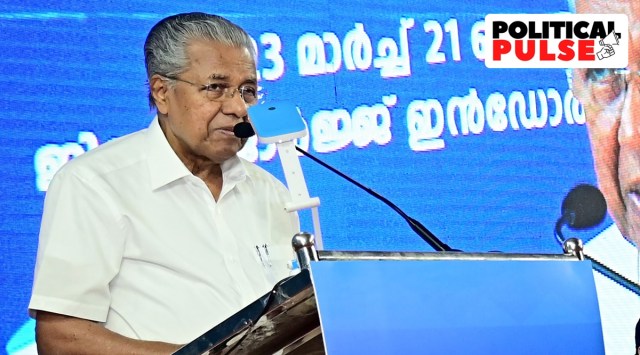Latest Comment
Post Comment
Read Comments
 Kerala Chief Minister Pinarayi Vijayan (ANI)
Kerala Chief Minister Pinarayi Vijayan (ANI) Kerala Lok Ayukta on Friday referred to a larger bench a case pertaining to alleged nepotism and anomalies in granting aid from the Chief Minister’s Distress Relief Fund (CMDRF) during the previous Left Democratic Front (LDF) regime.
When the case was taken up on Friday, Lok Ayukta Justice Cyriac Joseph and Upa Lok Ayukta Haroon Ul-Rasheed referred the matter to a three-member full bench. The Lokayukta order said “as there is difference of opinion between us on the basic issue whether the action of respondents (Vijayan and his cabinet colleagues from 2016 to 2021) in taking the impugned decisions as members of the Cabinet can be subjected to investigation under the provisions of the Kerala Lok Ayukta Act, and on the merits of the allegations, we are constrained to place this complaint for investigation by the Lok Ayukta and both the Upa Lokayuktas as per section 7(1) of the Kerala Lok Ayukta Act.’’
A final verdict in the case was much awaited in the state’s political circles as the anti-corruption body had completed its hearing in March last year and the verdict has been reserved since then. Last week, petitioner R S Sasikumar moved the high court alleging that the delay in verdict was “intriguing and denial of natural justice.’’
Opposition Leader V D Satheesan, however, said the Lok Ayukta decision was surprising. “The verdict has killed public faith in the anti-corruption body. In 2019, a full bench of the Lok Ayukta headed by Justice Pius Kuriakose had found that the case was maintainable and the Lok Ayukta can go into the merits of the case. A decision referring the case again to a full bench is wrong. I have to suspect it is a deliberate move to delay the verdict until Vijayan’s term is over,” he said.
It was in 2018 that R S Sasikumar, a former Syndicate member of Kerala University, complained against Vijayan and his 17 colleagues in the previous Cabinet with regard to the misuse of CMDRF. At present, only Vijayan remains in office among the respondents.
The crux of the petition was that the government had allegedly allotted Rs 25 lakh to the family of the late NCP leader Uzhavoor Vijayan. It was also alleged that the family of the late CPI(M) legislator Ramachandran Nair was given Rs 8.5 lakh from the CMDRF towards the cost of repaying a gold loan and vehicle loan and that Nair’s son was given a job with the state electricity board. In another alleged violation, Rs 20 lakh was given to the wife of a civil police officer who died in an accident while on escort duty for Kodiyeri Balakrishnan who was the CPI(M) state secretary then.
The petitioner pointed out that decisions of the cabinet amounted to corruption, favouritism, nepotism and lack of integrity while exercising their authority as public servants.
While this case remained pending with the Lok Ayukta, the CPI(M) government last year passed the Lok Ayukta (Amendment) Bill, 2022, taking away much of the authority of the body. The Kerala Lok Ayukta Act, 1999, passed by the then LDF government, mandated that a public servant (including the chief minister and ministers) vacate their office in the event that the Lok Ayukta or Upa Lok Ayukta submits a report holding them guilty of corruption. The report was binding on the government, with the competent authority (the governor, government or chief minister, depending on the accused party) required to accept the finding and submit an action-taken report to the Lok Ayukta within 90 days.
As per the amendment passed by the Assembly last year, the Lok Ayukta or Upa Lok Ayukta can now only make a recommendation to the competent authority, which can then accept or reject it. The governor is no longer one of the competent authorities with the Legislative Assembly, instead, taking over if the chief minister is the accused. In the case of Cabinet ministers, the competent authority is the chief minister and for MLAs it is the Speaker. Governor Arif Mohammed Khan refused to clear it.
The Opposition had alleged that the amendment had been introduced to protect the chief minister and his Cabinet colleagues in the wake of the pending case with the anti-corruption body.
In 2021, the then higher education minister K T Jaleel had to resign in the wake of a Lok Ayukta verdict in a case related to nepotism in appointments.


